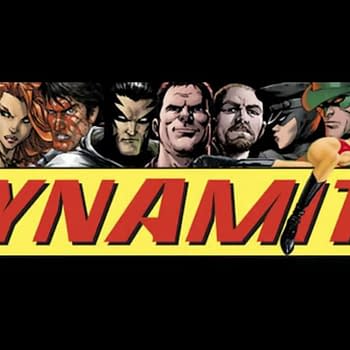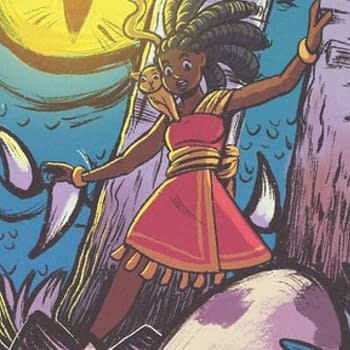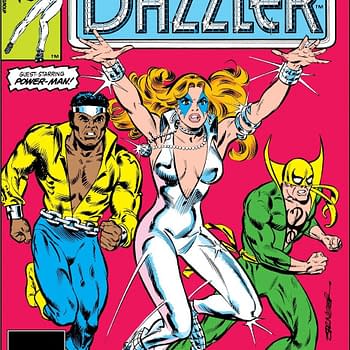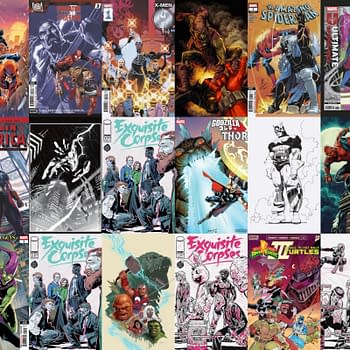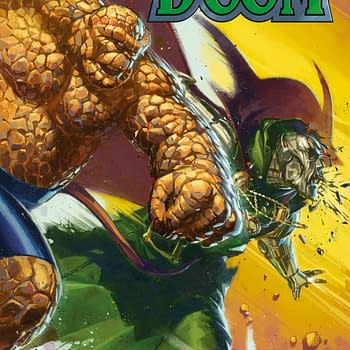Posted in: Comics, Recent Updates | Tagged: aces weekly, Comics, david lloyd, entertainment
'Let's Start A System Where The Creators Get Most Of The Money' – David Lloyd Talks ACES Weekly
By Olly MacNamee
Best known as the co-creator of V for Vendetta, David Lloyd has just celebrated the third birthday of his digital-only ACES Weekly anthology title and I was able to catch up with Dave at the recent Leamington Comic Con where he was the star guest and ask him about digital distribution, anthologies on the web and his hopes for a brave new world for digital comics, better deals for creators and for readers too.

David Lloyd: Well, I think the anthology gives you a chance to widen the reader base as much as possible. So, publishing an anthology that has something for everyone is a good way of doing that. And, although there are really strong stories in there, it is family-friendly too. We aren't using Garth Ennis level vocabulary. We are for everybody and that is part of the purpose of ACES Weekly. The other reason to do an anthology is that we are producing a weekly digital comic, so you really have to use the anthology format because you've got to have lots of different creators working at the same time. If you're relying on one creative team and only one creative team every week, that would be tough. 21 pages every week? You couldn't do that.
The anthology is good for production and for the readership. Hopefully people can embrace the digital distribution and think it's great. We are trying to break down barriers because traditional comic fans are used to paper copies of their comics. With ACES, we hope that they can see it's great. It can be read on their tablets, their desktops; you can even put it on your smart TV and make comics bigger. We're still striving, successful to a degree, but we aren't quite there yet because people are still resistant. I say, "Don't resist."

DL: Yes. The reason we used landscape is because the computer screen lends itself better to landscape better than the traditional portrait layout. We wanted a format that was common to all devices, whether that is laptop, smartphone or TV. I mean, look at the technology behind modern ' screens '. I mean, you can get a really sharper, illuminated reading experience through them.
OM: What other benefits are there for publishing and distributing digitally?
DL: We can offer a lot of extras in ACES Weekly. In print if you want to add another page, it's going to cost you more money. Well, in digital you don't have to worry about that at all. We can include a bumper collection of all sorts of stuff, like sketches, character designs and the like, for no extra cost. You can slot in work on the day we go live, another benefit of digital production. Printed comics may need a press deadline months ahead of sale date because they have to schedule the printing, ship it to distributors, all that stuff.

DL: What I always say when I travel around to conventions and promote ACES Weekly, is : it's just great comic art on screen not on paper. That's it. One of the reasons I was stimulated to do this was because I met Pepe Moreno in San Diego who'd had an experience where he'd done a book for a publisher on what is called a 'back-end deal' – where you get paid on what the sales are – and he went to the publisher of this particular book after a while and asked for his cut. The publisher said that there was no money left. He said, "What do you mean, there's nothing left? I did this book!" The publisher, after factoring in printing costs, distribution costs, and the rest, said there was nothing left. That was crazy. He realized that he had to do it digitally so he set up his own website for it. So, when I heard this, I thought, "Okay, let's do that, too." So, I got a whole bunch of people together and that's basically how it started.
We are an exclusively digital comic, but digital only relates to the delivery of the comic strips. When I started ACES Weekly people were asking me how IT had changed the art. It hasn't. It's only important in the delivery. We are just taking the comic art form off paper and putting it on the screen. That's it. We don't do motion comics by the way, we use the strength of traditional comics and put it on the screen where it looks even better. Nothing in print can compare with the luminescence of comics on screen.

DL: Yeah, although I would love to explore graphic tablets it's a question of time for me these days. ACES Weekly is a 24/7 job and I'm glad to do it. The last thing I produced in art was a story for ACES Weekly Volume 1, a while back. I just wanted to contribute to it. I am very proud of running ACES Weekly and proud of everyone involved in it, and that is my focus and what I'm spending my time doing. And, there's so many great people working with ACES Weekly, it's an incredible mix. For £7 you can access some 200 pages of stories. You'll be amazed by the quality and variety on there. We have up to 100 people working on this so far. And you don't need digital art to produce a digital comic. It can always be scanned.
ACES Weekly is about changing the production and distribution methods to the benefit of the readers, who will get a cheaper product, and to the benefit of the creators, who will get a better deal. We need to establish a currency for onscreen comics. Because for too long now people have been used to getting internet comics for free – either through web comics that have been done for fun – or through backlog manga dumped on the net. Comics on the internet have been seen as having little inherent value as a result. Getting people to pay for them, even at a extremely reasonable price, is tough.
Traditionally, the creators haven't made the money they should in most comics publishing. They never did. Let's start giving the creators what they deserve. Let's start a system where the creators get most of the money and not the printers, the distributors, and the publishers and all these other people who just make money from the creators efforts. They're simply enablers for a system we don't have to use any more when we have the almost direct-to-reader channel of cyberspace. There are only two important elements in comic storytelling – the creator and the reader. Everybody else is almost an irrelevance. ACES Weekly is just trying to offer that new method of entertaining readers with great comic art – because we can.
ACES Weekly can be found here.











